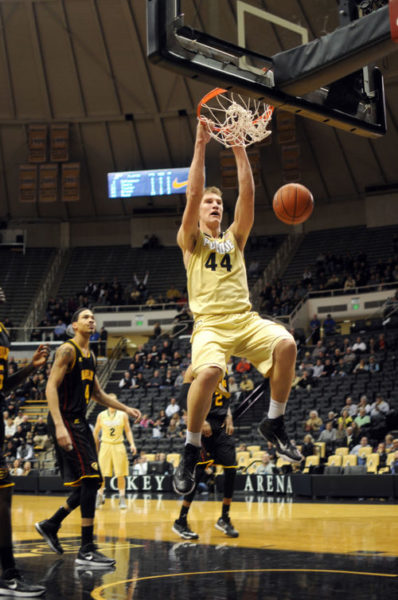Can Purdue’s (Isaac) Haas in the Middle Handle a Larger Role?
Posted by Brendan Brody on October 27th, 2016Last season Purdue boasted a brawny, physical specimen in the pivot who began the season with averages of 13.5 PPG, 5.3 RPG and 1.6 BPG on 63.3 percent shooting from the floor. Sophomore Isaac Haas took excellent advantage of an early suspension to senior AJ Hammons and Boilermaker fans are anxious to see what he can now do as the primary interior player. The 7’2”, 282-pound junior is expected to lead a Purdue club looking to shake off a disappointing First Round upset to Arkansas Little-Rock in the NCAA Tournament. With many of the same pieces still on the roster, Matt Painter’s club has the tools to learn from last year’s mistakes and make a deep run in 2017. Haas will have to prove that he can handle both a larger role in the offense as well as providing a defensive anchor for his team to truly reach its full potential, but all indications suggest that he can handle it.

Isaac Haas is now the main man in the pivot for Purdue with the graduation of AJ Hammons. (Edwin Jacobson, Purdue Exponent)
Haas has always been a productive player in the minutes he has received. He shoots the ball well, sporting a career mark of 56.8 percent from the field; and his 59.4 percent free throw rate would have ranked second in the Big Ten last year had he played enough minutes to quality. He’s simply too big of a physical mismatch for most college post defenders, which allows him to catch the ball wherever he wants and power through for a layup or a trip to the charity stripe. Despite some concerns about his stamina with the extra minutes, Haas should perform fine on the offensive end of the court. It’s the defensive end, rather, where he really needs to make an impression.
Per KenPom, Purdue ranked 11th nationally in defensive efficiency last season. The Boilermakers return six of their top nine contributors, but two of those three losses were players on the Big Ten All-Defensive Team (Hammons and Raphael Davis), and a third player in Johnny Hill who was a better on-ball defender than returnee guard PJ Thompson. It will therefore fall on Haas to improve his 18.4 percent defensive rebounding rate along with his 5.4 percent block rate. Forward Caleb Swanigan showed last season that he’s one of the best defensive glass cleaners in the league, but Hammons’ departure will be felt most acutely in the area of rim protection. Haas only needs to be slightly better on the boards to help Swanigan there, but he really needs to become more of a threat to block shots if Purdue wants to avoid a defensive letdown this season.
Purdue was also a good offensive team last season (19th nationally) and shouldn’t expect to drop off much in that area given the players returning and the addition of high-scoring freshman Carsen Edwards. More minutes for the highly-efficient Haas will help here too, but unless he can improve defensively, Painter may start to wonder what else he can do to push his team past its physical limitations.














































